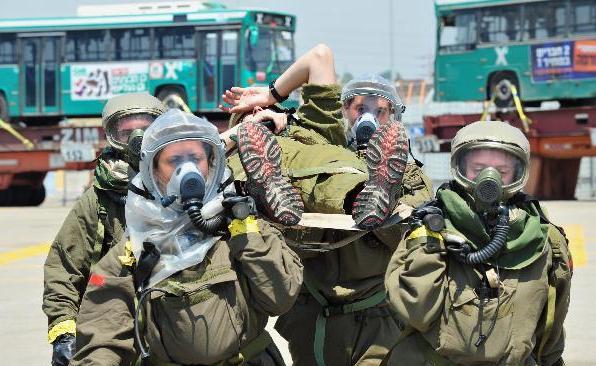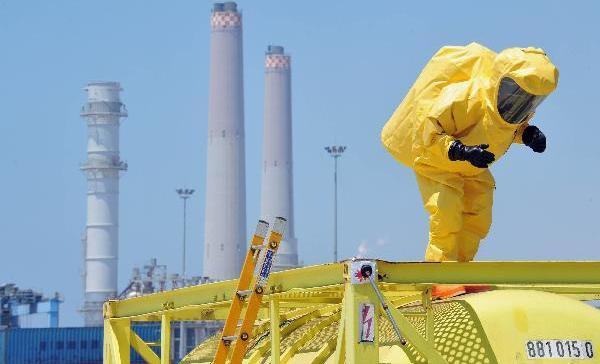Global General
Israel drills for potential mass missile attacks
(Xinhua)
Updated: 2011-06-23 11:28
 |
Large Medium Small |
|
 Members of Israeli army participate in an exercise which simulates a rocket attack on Ashdod Port, Israel, on June 22, 2011. Israel is holding a nation-wide, week-long emergency drills simulating simultaneous mass-casualty events.[Photo/Agencies] |
JERUSALEM -- The Israeli government, the military, rescue services, 80 municipalities, and millions of civilians on Wednesday drilled responses to a simultaneous mass missile strikes across the country.
This year's test, which was the high point of the week-long " Turning Point 5" drill, marks the first time in the five years the exercise has been held that the entire population was instructed to seek cover.
In the drill's scenario, it is the 13th day of a full-scale war, and Israel's foes have lobbed some 7,000 missiles, hitting Tel Aviv, Jerusalem, and other major population centers. Hundreds are dead and thousands wounded, according to Home Front Command Minister Matan Vilna'i, who led the government's civilian responses to the mass attack.
"In last year's exercise, about 47 percent of the population entered protected areas," Col. Efi Mishov, head of the Home Front Command's Population Department, told the Yisrael Hayom newspaper.
"The past several years have seen a moderate increase in exercise participation, and this trend is expected to continue this year, but not in drastic numbers," Mishov said.
The government security cabinet, as part of the drill, met for the first time in a secret underground bunker in the Jerusalem area. Israeli Prime Minister Benjamin Netanyahu and government ministers would use the facility in such a missile attack. Part of the drill included direct missile hits on the Knesset parliament building and on the nearby Prime Minister's Office.
|
 A member of Israeli army participates in an exercise which simulates a rocket attack on Ashdod Port, Israel, on June 22, 2011. Israel is holding a nation-wide, week-long emergency drills simulating simultaneous mass-casualty events.[Photo/Xinhua] |
The sirens were to sound once, as a part of the drill, and a second only in the event of a real attack. In several cities, among them coastal Ashkelon and Ashdod, and Beer Sheba in the northern Negev, malfunctioning sirens went off twice, scaring residents who thought it was a genuine emergency.
In hospital parking lots, police and Israeli Defense Forces soldiers, and civilian first-responders garbed in chemical warfare protection suits practiced mass intake and triage, spraying down adults, and -- using baby dolls -- infants suffering from chemical burns and wounds.
Dozens of ambulances pulled up, one after another, to discharge patients, in order to test the logistics of dealing with mass- casualty attacks on a scale Israel has not seen before.
As sirens across the country wailed, the country's 7.5 million citizens were instructed to enter bomb shelters and other " protected spaces," and remain inside for a short period.
Schools across the country practiced quickly and calmly entering prepared bomb shelters, and remaining inside for 15 minutes.
"At first I thought it was real, but then they told me it wasn' t real," said nine-year-old Maya Firestone, a student at Jerusalem 's Evelina De Rothschild school. "It was a little crazy because everyone was running around," Firestone said.
Before its 400 pupils filed out of the shelters and back to their classes, school principal Yossi Ohana, using a bullhorn, debriefed the students.
"Our goal was to evacuate all of the students within one-and-a- half minutes into this shelter," Ohana told Xinhua after the drill concluded.
The exercise, which was widely publicized in radio and television spots, as well as online, is meant to ready the populace for the worst, and comprehensively synchronize crisis- management responses to salvos of rockets from neighboring areas slamming into Israeli cities.
One of the simulation's goals is also to warn potential foes that such an attack would cause little damage to a government, public and military protected and readied for the worst.
"Our enemies know perfectly well that if they attack us, we will strike them with very tough blows, but we must prepare," Israel's Home Front Command Minister, Matan Vilnai, told Army Radio on Sunday, "because they have the capacity to fire missiles and rockets at all of our territory."
The Israeli army's former intelligence chief Amos Yadlin said on Wednesday that "these missiles will not disappear, even if a peace agreement with the Palestinians is signed."
| 分享按鈕 |